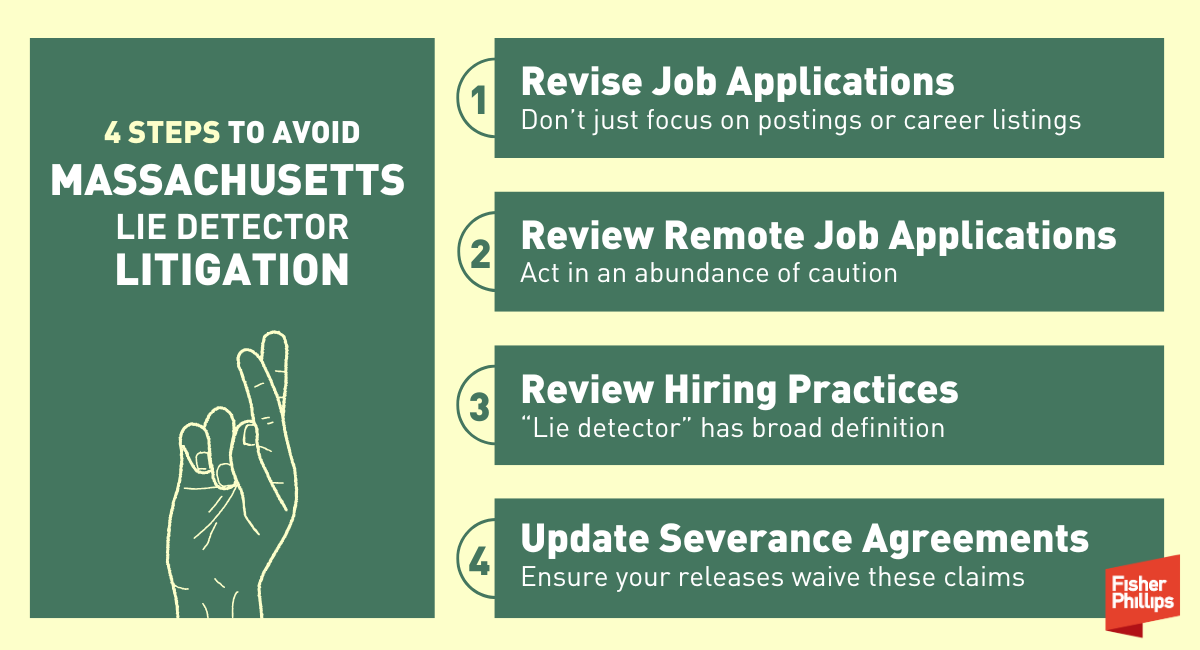Massachusetts Employers Facing a Wave of Lie Detector Litigation: Why You Need to Review Your Applications to Ensure Compliance
Insights
4.01.25
In recent months, Massachusetts employers have seen a flurry of lie detector-related litigation – all because unsuspecting employers failed to include a necessary disclaimer in their applications. A relatively obscure state law requires companies to include a specific written notice about lie detectors on applications or face what could become steep consequences. The requirement has caught the eye of enterprising plaintiffs’ attorneys and led to wave of employment litigation. What do you need to know about this development, and what is the simple fix you can implement to steer clear of a lawsuit?
Mandatory Lie Detector Disclaimer
For nearly 40 years, Massachusetts has prohibited employers from using lie detector tests as a condition of employment. And while lie detector tests are not common, state law says that “all applications for employment within the commonwealth” must contain this specific notice:
It is unlawful in Massachusetts to require or administer a lie detector test as a condition of employment or continued employment. An employer who violates this law shall be subject to criminal penalties and civil liability.
Any person who is “aggrieved” may bring a civil action individually or “for himself and for other similarly situated,” and the total damages are at least $500 “for each such violation,” plus attorneys’ fees.
But courts have not defined key terms in this law, including “aggrieved” and “each such violation.” It therefore remains unclear whether every applicant could be entitled to $500 plus attorneys’ fees after submitting an application that did not contain the required notice – especially when an employer did not actually administer a lie detector test.
Wave of Litigation
Beginning in 2023, we have seen a surge in class action litigation against large Massachusetts employers. In the first such case, an applicant alleged that a video assessment tool was a prohibited lie detector test and that the company failed to provide the required notice. The employer was unable to win the case with early procedural maneuvering and settled the matter in July 2024.
That settlement kicked off the onslaught of litigation we are now experiencing. After that matter was resolved, plaintiffs’ attorneys began filing a wave of class actions against Massachusetts employers – primarily retailers so far – alleging that the required notice was not included on job applications. And while large retailers might be a focus of much of the recent litigation, it won’t be long until plaintiffs’ attorneys focus their attention on employers in other industries across the Commonwealth.
4 Key Steps Massachusetts Employers Should Consider
To avoid similar claims, Massachusetts employers should immediately review their job applications and confirm that the mandatory notice is included. We recommend taking the following steps:
1. Revise job applications. This law applies to applications. You should confirm the notice is on the application itself – not your job posting or company careers page.
2. Review applications for remote jobs. The law does not address whether it applies to remote applicants based in Massachusetts. But any application submitted “within the Commonwealth” must contain the notice. This means that non-Massachusetts employers may be required to include the notice for remote positions if a Massachusetts resident might apply. In this instance, acting in an abundance of caution might be the best course of action.
3. Review hiring practices for prohibited “lie detector” tests. The law defines “lie detector” broadly, including any “device, mechanism, instrument or written examination, which is operated, or the results of which are used or interpreted by an examiner for the purpose of purporting to assist in or enable the detection of deception, the verification of truthfulness, or the rendering of a diagnostic opinion regarding the honesty of an individual.” This means that some interview tools may be prohibited in Massachusetts – not just traditional lie detector tests. You might want to check any AI-fueled hiring systems you have implemented or are considering implementing to determine whether these might fall within the scope of state law.
4. Update Massachusetts separation agreements and releases. You should update your separation agreements and confirm that Massachusetts agreements waive claims under this law.
Conclusion
We will continue to monitor developments under this law. Make sure you are subscribed to Fisher Phillips’ Insight System to get the most up-to-date information. If you have questions, contact your Fisher Phillips attorney, the author of this Insight, or any attorney in our Boston office.
Law Clerk Liana Brown co-authored this Insight.

